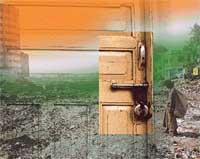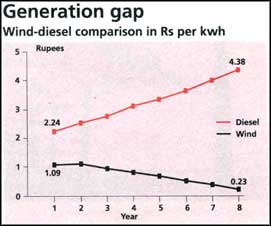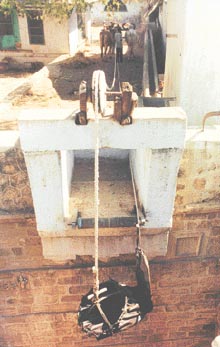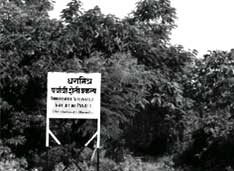Do not rule out 9% growth, says FM
A day after presenting his fifth Budget in the UPA government, Finance Minister P Chidambaram said budgets did not win elections, unless they were properly marketed. In a detailed interview on Saturday, Chidambaram said he still aimed at nine per cent growth for the economy in 2008-09. He also indicated that the surcharges on income-tax should go, provided revenues remained buoyant. Excerpts from the interview: You have presented five budgets in a row and looking back at them, what would make you the happiest about them and what would disappoint you? My happiest moments would be that my batting average so far has been 8.8 per cent. That is the economy. What about the Budget per se? The Budget was intended to set the course and pace of the economy and I think we have done fiscal consolidation, although we can argue about some items below the line. I think we have demonstrated that moderate and stable tax rates bring better tax compliance. We have demonstrated what inclusive growth is, that instead of being fixated only on growth, we can use the growth process to promote inclusive growth. I think these are many of the happy memories of the last four years. The disappointment is that we should have taken the reform process forward faster. There are still large areas of the economy which are under government controls. And if these controls had been removed, the economy would have grown faster. In case this is your last Budget? I will be happy if this is my last Budget. There are other things to do in life. People are calling this as an election Budget. Is that the way to look at it? For the last few years, every Budget has been an election Budget because every year is an election year. 2006 was an election year, 2007 was an election year, and 2008 is an election year. I think that is not a very correct way to describe it. I have presented the fifth Budget of this government and, according to schedule, the elections are in May 2009. So I would not agree that it is an election Budget. Will it help you win the elections? Budgets do not decide elections. It is how you communicate to the people what the Budget contains and what it wishes to do in the next year, which happens to be the election year. Take, for example, the Tamil Nadu state elections in 2006. It was the election manifesto which won the election. Likewise, a Budget, if it is communicated well to the people, can help win an election and what is wrong in that? You have done a Budget where there is a lot for the people, for farmers, for the middle class, tax payers, although companies are unhappy. So having done this, why not just go ahead and sign the nuclear deal and tell the Left if it wants to withdraw support, it can go ahead, as you now have something to go to the people with? These are the questions you need to address to the UPA leadership and the Prime Minister. I am only a finance minister. You have introduced many new taxes over the years and now you removed one of them, the banking cash transaction tax. I said so even when I introduced it. It is not a tax revenue raising measure. It is only a source of income issue. I would like to go back to your speech in 1997 when you said I propose to amend certain sections of the Income-Tax Act, to provide for the removal of artificial disallowances, travel and hotel expenses incurred for legitimate business purposes and you said it was a matter of simplification. So using that logic, why would you not do away with the fringe benefit tax, as a matter of simplification? I have explained this a number of times. I can deal with that expenditure as allowable or disallowable expenditure, which means I need discretion in the hands of the assessees. It was the assessing officer who enjoyed the discretion for many years until we brought in FBT. Now the assessing officer has no discretion. If this expenditure is made, you can take a base of 50 per cent or 20 per cent and we tax it. I think this is far better than leaving discretion in the hands of the assessing officer to decide whether the expenditure is allowable or to be disallowed. There is complication in FBT on employee stock options, for which industry might have come to you hundreds of times. I will take you into confidence. The FBT on employee stock options has been worked out in close consultation with industry CFOs. On the personal income-tax front, a tax payer may see halving of his income tax liability. If somebody makes Rs 5 lakh a year, he is earning Rs 40,000 a month. Most probably he lives in a city or a town. Rs 40,000 in a city or a town for a family is not a very large income. Of course, we have given him the tax relief, because compliance has increased, revenues have improved and I think moderation by adjusting the slabs will bring in more revenues. You will lose some of the revenue due to changes in the slabs. A large number of people move on to pay tax so that they can have a larger part of income on their balance-sheet and they can build capital. So when we move the tax slab, an assessee would not stop paying tax. He will still pay the tax that he paid the previous year and even build more capital for himself. So, we will get the revenues. You have assumed that income-tax revenue will climb by 18 per cent in 2008-09. It is a very reasonable assumption. People paying tax will continue to pay tax. They will simply comply better and I do not want to say anything more. They have been very nice to the Government in the past few years. Why should I say anything unkind about tax payers? Compliance will improve and I am sure everybody will comply better and we will get the revenues. That is our assumption and that is our assessment of the situation. There is no reason to assume that direct taxes will not grow at the same rate as this year. That is the question I have on corporation tax, because the trend in corporate profits shows a clear slowdown and is now running at around 15 per cent. Yet you assume a more than 20 per cent increase in corporation tax next year? I expect the demand to push up corporate toplines as well as bottomlines. There are signs that the global economy may slow down. Is it time to ensure that India keeps away from it by taking some measures? I said so in my speech that there is a slowdown especially in the consumer goods, and more particularly in consumer durables. I have identified various sectors - cars, two-wheelers, three-wheelers, paper and we have even cut taxes for buses and chasses. What about the corporation tax rate? Companies are doing well. They are making good profits. They are paying good taxes and it still works out to about 22 to 23 per cent effective tax rate for all companies. There is no reason to tinker with it this year. Why fix something which is not broken? You have been listing tax concessions that the government gives away. Would it not make sense to drop the nominal rate and remove some of the concessions? If you can get me agreement from the three chiefs of the chambers of commerce on which concessions can be removed, I will be very happy to do that. Every exemption provision has a lobby behind it. Let us now turn to the biggest announcement of the Budget, the farm loan waiver scheme. One of the questions is that it is meant only for those whose loans are overdue. But what about those who have sold their jewellery, land and have actually repaid the loans but will not get the benefit? So, what can I do about it? See it is always easy to pit one against the other. People will say what about those who borrowed from moneylenders. There is nothing I can do about it. There is no quantification of that















